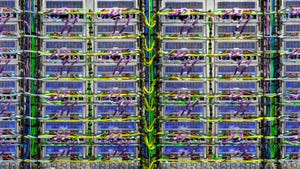Here’s What Cybersecurity Experts Worry About This Year
Cybercrime is getting cheaper and easier, and more players are getting into the business, while enterprise attack surface is growing.
February 8, 2019

Last year was a cybersecurity nightmare, with record-setting data breaches, record-setting DDOS attacks, and increasingly sophisticated attackers. This year promises to be no better – and it may not take long.
"The next big data breach is already underway," said Jason Hong, associate professor in the human computer interaction institute at Carnegie Mellon University, pointing out that it usually takes a while for a breach to be discovered. "We just don't know which organization will be affected yet."
As cyberattacks get cheaper and easier to implement, more criminals are expected to get into the business. At the same time, continued proliferation of Internet of Things devices is rapidly expanding the available enterprise attack surface, cybersecurity experts say. And in addition to private-sector cybercriminals, nation-states will be stepping up malicious cyber activities. But there are also some positives to look forward to, including better defensive capabilities and generally more focus on security by enterprise IT leaders.
Cybercrime Is Getting Cheaper and Easier
For criminals looking to get into a line of work that's less physically dangerous, and has fewer risks of getting arrested, cybercrime will continue getting more and more attractive.
Even those with little technical skill can get in on the game and buy everything they need to get started on the dark web, and the prices are getting lower, and the tools are getting more sophisticated.
"Criminals sell ready-made solutions for attacks," said Leigh-Anne Galloway, cybersecurity resilience lead at Positive Technologies. "Many malware developers even provide technical support."
IoT Devices Will Become a Base for New Attack Records
Distributed denial of service attacks are increasingly using compromised IoT devices -- like connected cameras -- to send the traffic. The IoT botnets are also used to spread malware and worms.
This year will see a major jump in these type of attacks, as the number of devices hits new highs.
"Every added device is an added attack surface, and we're in for a very rude awakening in the near future," said Ken Underhill, an instructor at cybersecurity training startup Cybrary.
There is some progress in adding security features to the devices, but not enough, according to Carolyn Crandall, chief deception officer at Attivo Networks.
"IoT-enabled device innovation will continue to outpace the security built into those devices," she said. What regulations are enacted on the state level will be inadequate, she said, only providing a false sense of security.
Nation States Will Step Up Attacks
"Cyberattacks have become a way of war, and geopolitical tensions have never been higher," said John Cassidy, CEO and co-founder at King & Union, a cybersecurity firm based in Alexandria, Vir.
Russia has been in the news lately as a source of both politically and financially motivated attacks. Financially motivated attacks in particular are likely to increase in 2019 since the criminals are now sitting on a warchest of money they've made from ransomware and cryptojacking, some of which they'll invest in research and development.
But other countries will also make themselves felt year.
"Iran will launch attacks on the US in retaliation for sanctions," said Dmitri Alperovitch, CTO and co-founder at CrowdStrike, Inc. "China will continue to ramp up commercial cyber espionage as trade war escalates."
In addition, nation-state backed attackers have access to resources that the typical criminal doesn't, such as artificial intelligence.
"Attackers will start to leverage adversarial machine learning in their attacks to bypass security products leveraging machine learning for detection of malware," said Alperovitch.
IBM scientists have already demonstrated a proof-of-concept of a highly targeted and evasive attack tool, said Nir Gaist, CTO and co-founder at security firm Nyotron.
"We believe a significant attack or strain of malware will leverage AI in 2019," he said.
Nation-states are also investing in quantum computing, which promises to make much of today's encryption obsolete.
"In 2019, we’re going to see advancements in quantum computing in the cybersecurity industry," said Bob Flores, advisor at Fidelis Cybersecurity. "Firms need to start preparing now, as this technology can, and will, destroy current security mechanisms."
Quantum computers, while not particularly powerful today, are already hitting the market, he said.
"We could see a sharp increase in attacks leveraging quantum computing as early as later [this year],” he said. "If enterprises aren’t prepared, this could lead to breaches with the potential to damage numerous businesses, and lives."
More Cybersecurity Commitment
As new breaches continue to hit the headlines and regulators make privacy and cybersecurity a top priority, corporate leadership is paying attention.
For data center managers, this means that enterprise customers – both internal and external – are increasingly making security a top priority.
One of the ways this is felt is that CISOs are becoming more strategic in their approach to cybersecurity.
"I've had many independently say that they recognize the importance of it and are now bringing enterprise development, business leaders and legal along for the ride," said Dave Klein, senior director for engineering and architecture at GuardiCore. "It makes the whole organization more proactive."
This also opens up more opportunity for data centers to offer value-added security products and services.
This past year, for example, data center providers have begun to deliver more security options for payment companies, such as hardware security modules for storing encryption keys.
"I expect we’ll see this trend expand beyond payment service providers and impact enterprises across all other industries in 2019," said Patrick Lastennet, director of business development at Interxion.
Better, Cheaper, Smarter Security Tech
As a result of technical innovation in the fields of artificial intelligence and machine learning, as well as pressure from price-sensitive customers and nimble competitors, expect to see cybersecurity technology get easier to use, more powerful, and less expensive.
"As the endless cycle of cyberattacks continues, the security industry will come under assault from its customers for perpetuating a growing burden of cost that’s not productive to the mission of an organization," said Malcolm Harkins, chief security and trust officer at Cylance. "Better technology should allow customers to better manage their costs, and organizations who do not understand this will face waves of backlash in the new year."
Areas where we could see cost savings include automated penetration testing, and automatic classification of data as sensitive and requires additional protection.
Today, the data has to be manually classified by users, he said. "But users are lazy."
AI will also increasingly play a role in basic triage, determining if something is a malicious event or a false positive.
"While this isn’t a replacement for the analyst, it will provide more time for them to perform more advanced decision making and analysis," said Jason Rebholz, senior director at Gigamon, a Santa Clara, Calif.-based cybersecurity vendor.
As a result, AI will help stop at least one major breach in 2019, predicts Tim Steinkopf, president at Centrify, a Santa Clara, Calif.-based security vendor.
"The application of AI in 2019 can help tilt the battlefield in favor of the good guys," he said.
About the Author
You May Also Like

.jpg?width=300&auto=webp&quality=80&disable=upscale)





